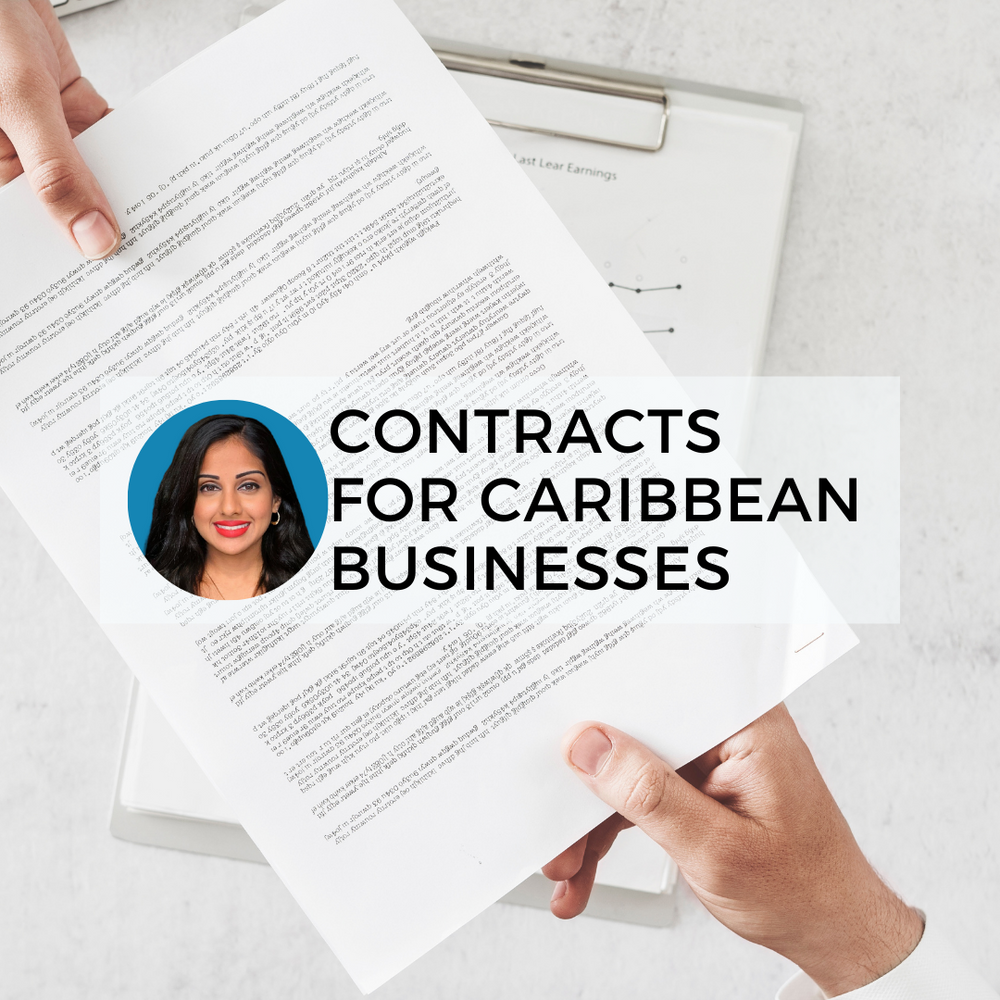What contracts do I need for my Caribbean business?

Running a Caribbean business can be daunting. The legal system can seem complicated and you might not know where to start. Each jurisdiction is different. However, general concepts do overlap. The following is a summary of the main contracts that Caribbean businesses, or any business, often need.
We encourage you to speak with a lawyer in your state. You can find one by going to your local Legal Aid, calling your state bar association, or searching online.
Businesses usually use the following contracts: (1) Service Agreement, (2) Independent Contractor Agreement, (3) Non-Disclosure Agreement, and (4) Non-Compete Agreement.
The best way to understand the legal system is to break it down into categories.
Businesses should (A) form an entity (like an LLC), (B) trademark their brand, and (C) use contracts for business dealings.
With regards to contracts, any business deal should be put in writing. The main contracts are Service Agreements, Independent Contractor Agreements, Non-Disclosure Agreements, and Non-Compete Agreements.
You don't have to reinvent the wheel every time you need a contract. Templates are a great way to customize each business dealing. You just fill in the portion that is unique to the deal. Pick a template that fits the situation, and then write in the terms of the deal.
Here is an overview of the 4 main business contracts:
What is a Service Agreement?
You should use a Service Agreement if you are being hired by someone else.
A Service Agreement is best used when you are being hired by another person to complete a task. For example, if you are being hired to paint a house, you should fill out a Service Agreement and have the homeowner, or the person hiring you, sign the agreement.
This can help ensure that both parties have the same expectations and understanding about the work that needs to be done.
A written agreement is also necessary if the amount of money involved is over $500 in Florida. In Florida, a court will not enforce an oral agreement relating to money over $500.
What is an Independent Contractor Agreement?
You should use an Independent Contractor Agreement if you are hiring someone else.
An Independent Contractor Agreement is best used when you are hiring another person or company to complete a task. Having an Independent Contractor Agreement helps to reduce the risk of conflict by clearly laying out all the applicable terms.
Make sure your expectations are written out. Do not assume that just orally telling the hired person or vendor will be sufficient.
For example, you can use an Independent Contractor Agreement if you are hiring someone to renovate your bathroom.
Proper contracts should include the scope of work, payment terms, deadlines, and court venues in the event of litigation.
What is a Non-Disclosure Agreement?
A Non-Disclosure Agreement should be used if you want to prevent a person from revealing confidential information about you or your company.
Employers often include Non-Disclosure Agreements and Non-Compete Agreements as part of their hiring package. Nevertheless, an employer can still have an existing employee sign these agreements under certain conditions afterwards.
Non-Disclosure Agreements are important to protect a company's confidential and secret information from being revealed to the public or the company's competitors.
For example, a Non-Disclosure Agreement could require an employee never to disclose or reveal a company's marketing strategies, customer list, pricing strategies, and secret formulas.
Coca-Cola likely requires any employees who deal with their secret drink formula to sign NDAs in order to avoid this trade secret from being revealed and copied.
What is a Non-Compete Agreement?
A Non-Compete Agreement should be used to prevent a former employee from soliciting your customers or working for your competitor.
In conjunction with the Non-Disclosure Agreement, a Non-Compete Agreement is valuable to protect a company against unfair competition.
A Non-Compete Agreement can restrict a former employee from taking your customers and working for a company in a similar industry.
It is important to note that not all states enforce these agreements on the grounds that is contrary to public policy.
However, Florida law does allow an employer and employee to enter into a Non-Compete Agreement. The restraints on time and geographical area must be in accordance with Florida law or else a court will refuse to enforce it. For example, a Non-Compete Agreement restricting a former employee from working for a competitor for over 5 years would almost certainly be struck down by a Florida court.
Therefore, make sure that your templates include all necessary terms pursuant to local state laws.
Disclaimer: This article does not provide legal advice. Legal advice can only be provided after a client and attorney have entered into a retainer agreement. This post is copyrighted by Melissa D. Goolsarran Ramnauth, Esq. | Trademark & Business Attorney | (754) 800-4481 | www.mdgrlaw.com.